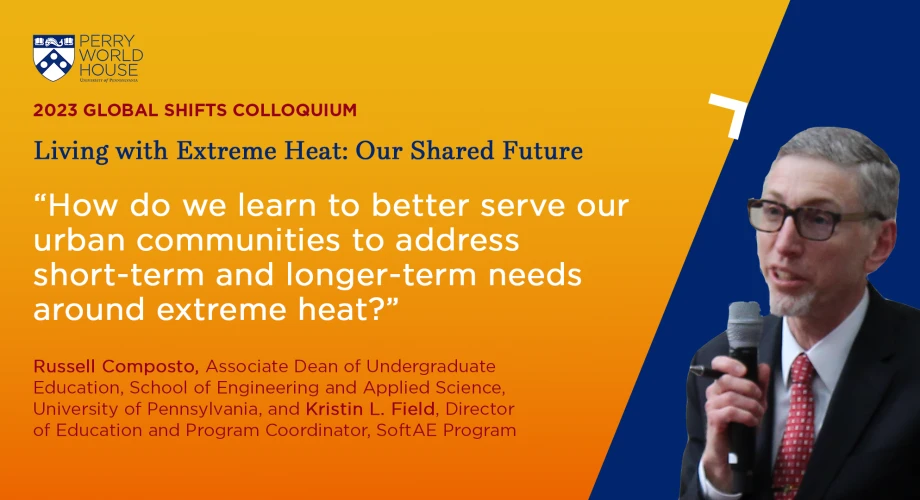
Russell Composto is the associate dean of undergraduate education at the School of Engineering and Applied Science, University of Pennsylvania (UPenn). Kristin L. Field is the director of education and program coordinator for the Penn-based SoftAE Program, a National Science Foundation Research Traineeship program.
In their recent article for the Perry World House’s Global Shifts Colloquium, Russell Composto and Kristin L. Field delve into the pressing global issue of climate change. From developing user-centered solutions for individuals affected disproportionately by extreme heat in urban areas like that of UPenn’s Philadelphia to researching and developing soft material solutions to address climate change, the article highlights almost half a decade of involvement of Composto and Field in collaborative climate research efforts to enact long-term improvements to the current climate situation. The article highlights the importance of collaboration, community engagement, and ingenuity in developing sustainable and realistic solutions with article summary points as follows:
- Current quantification metrics like the Philadelphia Heat Vulnerability show evidence of climate issues like extreme heat disproportionately affecting different regions of the city of Philadelphia. The Philadelphia Heat Vulnerability Index combines sociodemographic and health data with heat maps to identify and prioritize intervention in the most vulnerable regions.
- After being awarded an international NSF grant “Research and Education in Active Coatings Technologies (REACT) for the Human Habitat,” thirty-seven scientists from UPenn worked to develop a user-inspired climate shelter for use in these vulnerable regions. However, the project encountered setbacks due to a lack of understanding regarding existing sheltering materials and community user needs.
- To better understand local needs and interest in the climate projects, there was a partnership with the Penn Institute for Urban Research (Penn IUR) on the topic of “Adapting to Extreme Heat in Philadelphia to Increase Human Vitality.” This was achieved through a collaboration between the Penn Undergraduate Research Mentoring Program, the Center for Undergraduate Research and Fellowships, and the City of Philadelphia’s Office of Sustainability (OOS). Two UPenn undergrads Sarah Sterinbach and Seito Sanford worked to understand both current material limitations and ongoing initiatives, as well as develop collaborations with the community on extreme heat topics.
- The most recent efforts to address climate issues like Extreme Heat are the Soft AE training program which brings together the powerful tools of data science with the promise that soft materials brings for innovating for society’s needs, along with basic training in science policy and how technology and innovation are adopted and regulated. Led by Penn Engineering’s Chinedum Osuji, this newest collaborative effort at UPenn hopes to align STEM research to addressing the practical realities like that of extreme heat.
Read more about these highlights here in the article.